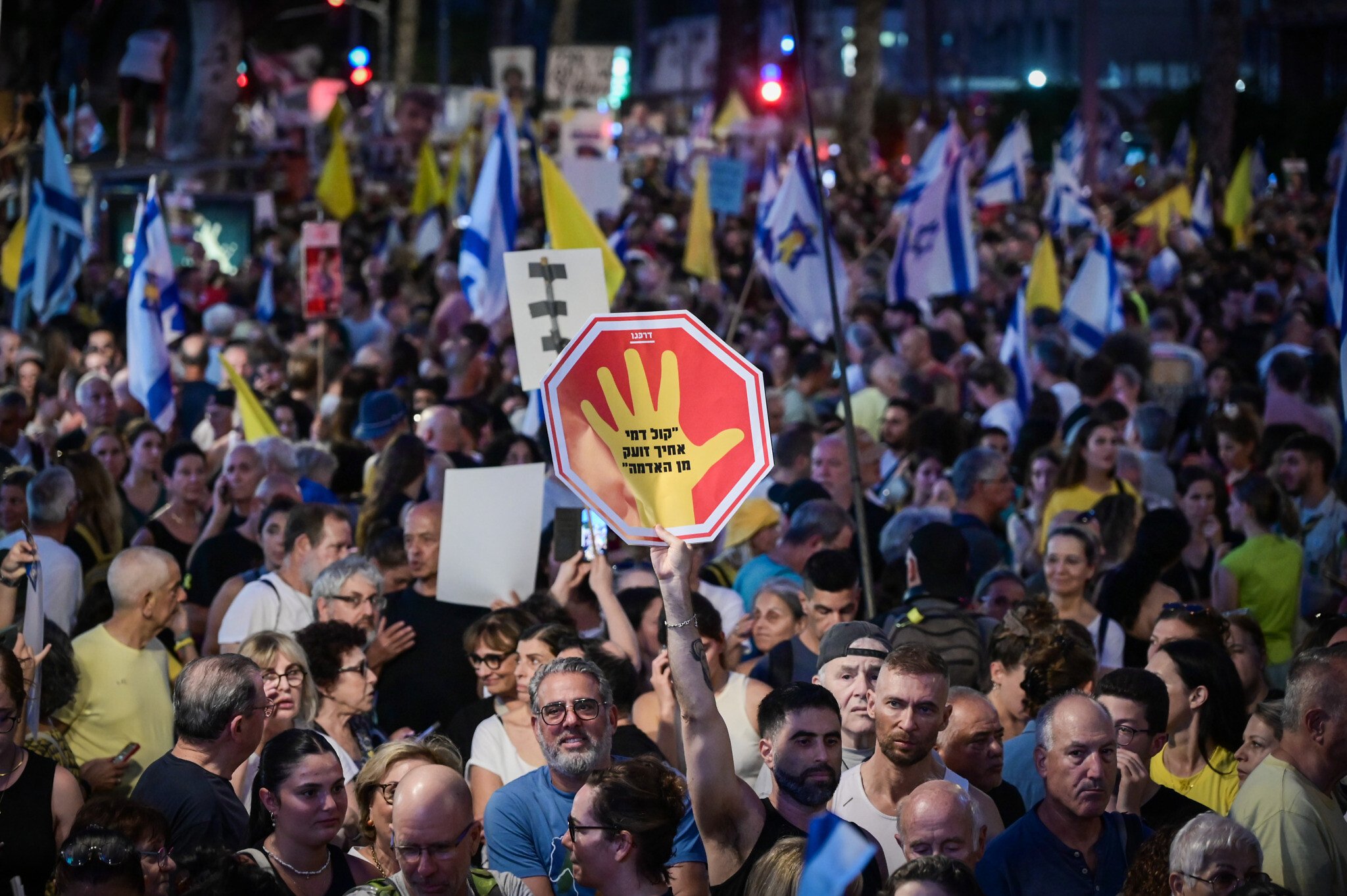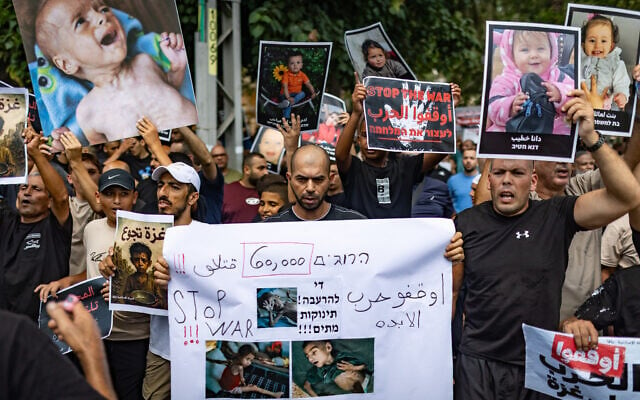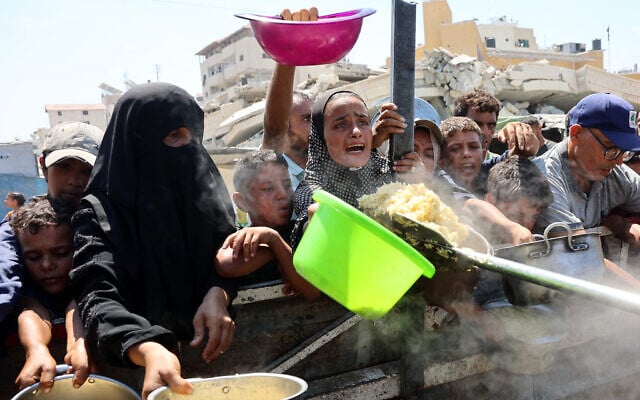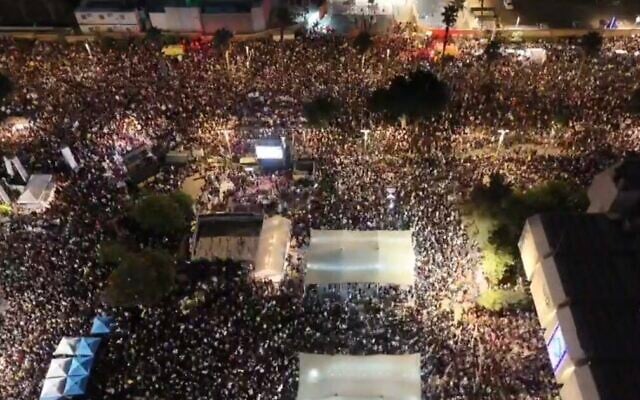



Families of hostages held in Gaza called on the public to take to the streets on Saturday evening in support of the 50 people still held in Hamas captivity for nearly 700 days.
The central weekly protest will take place at Hostages Square outside the Tel Aviv Museum at 8 p.m.
Addressing the crowd will be Liran Berman, brother of hostages Gali and Ziv Berman; Dani Elgarat, brother of murdered hostage Yitzhak Elgarat; Roni Adar, sister of murdered hostage Tamir Adar; Hagai Angrest, father of hostage Matan Angrest; and Yonatan Shamriz, brother of former hostage Alon Shamriz, who managed to escape captivity along with fellow hostages Yotam Haim and Samer Talalka, before being gunned down by Israeli troops who mistook them for terror operatives.
Alongside the Tel Aviv rally, additional gatherings will take place at Sha’ar HaNegev Junction, Kiryat Gat, Jerusalem and other locations.
Despite police canceling its permit, a major peace march led by an Arab society was set to go ahead in Tel Aviv on Saturday under the banner “Stop the Starvation, Stop the War – Yes to Life and Peace,” expected to draw thousands of Arab and Jewish participants, according to organizers.
Police withdrew the permit on Thursday evening after previously granting it, organizers said, demanding the number of participants be capped at 500 instead of the 5,000 originally approved.
Earlier this week, Tel Aviv Police District Commander Haim Sargaroff informed organizers that he would revoke the permit “due to the excess of events” the police already had to cover, according to a Haaretz report, including the weekly anti-government rally on Begin Road and the weekly protest for the hostages at Hostages Square.

The demonstration, which is set to begin at 4:30 p.m. in Dizengoff Square and proceed to Habima Square, calls for “an end to starvation, an end to the war, and the return of the hostages.”
It is being led by the High Follow-Up Committee for Arab Citizens of Israel, the leading umbrella organization representing the country’s Arab minority, together with the Partnership for Peace movement and a coalition of human rights groups.
Following the cancellation of the permit, Committee Chairman Mohammad Barakeh accused authorities of trying to silence Arab opposition to the war.
“We insist on the right and the duty to raise a mass outcry against the war of annihilation and starvation,” he said in a statement, calling on “democratic Jewish forces to join us and raise their voices” against attempts to suppress protest.
Barakeh charged that the police’s move was “a political decision dictated by the government” and vowed the rally would go ahead regardless.
He added, “We must turn over every stone to immediately stop this cursed war. In all the petitions we’ve submitted against bans on demonstrations, the judicial system has sided with the establishment — but we will not give in.”
Speakers at the event will include civil society representatives, community leaders, peace activists, and relatives of hostages held in Gaza.
The demonstration also carries political weight, as it will feature the participation of all four Arab-majority parties — Hadash, Ta’al, Balad, and Ra’am — who are currently engaged in ongoing discussions over reviving the Joint List alliance.

The Joint List was a unified slate of Arab parties that, despite their sharply differing ideological views, had a track record of energizing Arab voters and bringing the community unprecedented political influence.
It split due to internal fighting in 2021 when Ra’am broke away, and it collapsed the following year ahead of the 2022 election.
That political fragmentation has weighed heavily on Arab turnout and influence — a gap that mass protests are now beginning to fill.
“There has been a growing number of protests in Arab society against the war. We’re talking about tens of thousands. It’s a very important protest,” said a Hadash source with knowledge of the event.
They described the upcoming protest as the largest yet in a growing wave of Arab-led demonstrations against the war.
In July, over 10,000 people demonstrated in the northern Arab town of Sakhnin against the war, and Arab lawmakers and community leaders staged a three-day hunger strike over conditions in Gaza, specifically highlighting widespread food shortages.

A global hunger monitor, the Integrated Food Security Phase Classification (IPC) system, declared for the first time on Friday that famine has struck densely populated northern Gaza, 22 months after the outbreak of war in the enclave following the deadly Hamas invasion of Israel on October 7, 2023.
According to the IPC report, an estimated 514,000 people — or nearly a quarter of Gaza’s population — are experiencing famine, and that number is expected to rise to 641,000 by the end of September.
According to a counter-report by COGAT, the Defense Ministry’s main liaison body to the Palestinians, the IPC’s warning “is false and relies on partial, biased data and superficial information originating from Hamas.” The IPC, it charged, “chose to ignore the information provided by Israel and preferred to stick with incomplete and misleading information.”
Israel has rejected accusations that it is deliberately using starvation as a weapon. COGAT has said it “invests considerable efforts” to ensure assistance reaches civilians in Gaza.
Following August 17’s strike and protest day, which saw widespread rallies over the government’s handling of the hostage crisis, families of the hostages were calling on Israelis to join a nationwide day of solidarity on Tuesday, August 26.
Families have increased their protest actions over the government’s decision to expand the war in Gaza with a new offensive rather than sign a deal to return the abductees.
The planned event on Tuesday, dubbed “Israel Stands Together,” will feature demonstrations and public gatherings across the country, culminating — as on August 17 — with a 7 p.m. march from Savidor Central Train Station to Hostages Square, where at 8 p.m. participants will issue a collective demand: “Bring them all home now.”
A statement from the Hostages and Missing Families Forum said, “The [ government is] about to sabotage the agreement! On Tuesday, Israel stands together — leave your homes, show solidarity with the hostages.”
“The government is disconnected from the people and is sacrificing its citizens, but 80% of the population stands with the hostages, and only the people will bring them all home,” the statement continued.

Hamas recently said it had accepted a partial, phased hostage deal that Israel had agreed to in the past, while Netanyahu has vowed to push on with his new planned offensive in Gaza City and to negotiate only for a comprehensive deal that would ensure the release of all the hostages.
Terror groups in the Gaza Strip are holding 50 hostages, including 49 of the 251 abducted in the Hamas onslaught of October 7, 2023, which sparked the war in Gaza. They include the bodies of at least 28 confirmed dead by the IDF. Twenty are believed to be alive, and there are grave concerns for the well-being of two others, Israeli officials have said. Hamas is also holding the body of an IDF soldier killed in Gaza in 2014.
The Hamas-run Gaza health ministry says more than 60,000 people in the Strip have been killed or are presumed dead in the fighting so far, though the toll cannot be verified and does not differentiate between civilians and fighters.
